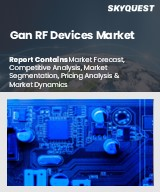
|
시장보고서
상품코드
1755921
RF GaN 시장 예측(-2032년) : 재료 유형, 디바이스 유형, 웨이퍼 사이즈, 용도, 최종사용자, 지역별 세계 분석RF GaN Market Forecasts to 2032 - Global Analysis By Material Type (GaN-on-SiC, GaN-on-Silicon, GaN-on-Diamond and Other Materials), Device Type, Wafer Size, Application, End User and By Geography |
||||||
Stratistics MRC에 따르면 세계의 RF GaN 시장은 2025년에 17억 달러를 차지하며 예측 기간 중 CAGR은 22.2%로 성장하며, 2032년에는 72억 달러에 달할 전망입니다.
"RF GaN"은 무선 주파수 환경에서 질화갈륨 반도체의 활용을 설명합니다. 위성 통신, 레이더 시스템, 무선 인프라의 소형 고성능 부품은 높은 내압, 전력 밀도 및 효율로 잘 알려진 RF GaN을 통해 실현되고 있으며, GaN은 실리콘이나 GaAs와 같은 기존 재료보다 우수한 온도 및 주파수 성능을 제공하므로 고주파, 고출력 무선 주파수 디바이스에 적합합니다. 고주파, 고출력 무선 주파수 디바이스에 최적입니다.
PwC 보고서에 따르면 5G 기술은 2030년까지 전 세계 GDP에 1조 3,000억 달러의 기여를 할 것으로 예측됩니다.
레이더 및 전자전 시스템 분야 수요 증가
레이더 및 전자전 시스템 수요 증가는 RF GaN 시장의 매우 중요한 촉진제입니다. 이러한 용도에는 고주파, 고출력, 고효율 부품이 필요하며, GaN은 이러한 측면에서 우수합니다. 특히 첨단 레이더와 전자전 능력의 통합 등 세계 국방 시스템의 현대화는 RF GaN 장비의 채택을 가속화하고 있으며, GaN 기반 솔루션의 우수한 전력 밀도와 열 성능은 차세대 군 및 항공우주 플랫폼에 필수적인 요소로 시장의 강력한 성장을 가속하고 있습니다.
열 관리의 과제
GaN 디바이스는 높은 전력 밀도와 주파수에서 작동하므로 상당한 열이 발생하며, 효과적으로 열을 방출하지 않으면 신뢰성과 디바이스 수명을 저해할 수 있습니다. 또한 소형 고성능 시스템에 GaN을 통합하는 것은 이러한 문제를 더욱 심화시켜 첨단 냉각 솔루션과 혁신적인 포장 기술을 필요로 합니다. 이러한 복잡성은 개발 비용과 시장 출시 기간을 증가시키고, 특히 비용에 민감한 용도에서 폭넓은 채택을 제한할 수 있습니다.
AI 기반 방어 시스템과의 통합
첨단 AI 알고리즘을 고주파, 고출력 GaN 장비와 결합하면 최신 국방 플랫폼에서 실시간 데이터 처리, 적응형 신호 관리 및 위협 감지 기능을 강화할 수 있습니다. 또한 AI와 GaN의 시너지 효과는 레이더, 전자전, 통신 시스템의 효율성을 증폭시켜 보다 스마트하고 자율적인 군 작전을 위한 길을 열어줄 것입니다. 이러한 융합은 이 분야에 대한 막대한 투자와 기술 혁신을 촉진할 것으로 예측됩니다.
GaN 웨이퍼 및 기판 공급망의 혼란
GaN 웨이퍼 및 기판 공급망의 혼란은 RF GaN 시장에 큰 위협이 될 것입니다. 제조업체는 한정된 수공급업체에 고품질 GaN 재료에 의존하므로 지정학적 긴장, 자연재해, 물류 병목현상 등의 위험에 노출되어 있습니다. 또한 실리콘 카바이드(SiC) 및 고순도 GaN과 같은 중요한 기판공급이 중단되면 생산 지연, 비용 상승 및 수요 미달로 이어질 수 있습니다.
COVID-19의 영향:
COVID-19 팬데믹은 초기에는 공급망 중단과 최종 사용 산업 수요 감소로 인해 RF GaN 시장을 혼란에 빠뜨렸습니다. 그러나 이 위기는 디지털화, 원격 근무 및 통신 인프라의 확장을 가속화하여 고성능 RF 부품에 대한 수요를 증가시켰습니다. 산업이 적응하고 규제가 완화됨에 따라 통신, 국방, 가전 등의 분야가 회복세를 보이며 RF GaN 시장의 빠른 회복과 재성장을 이끌었습니다.
예측 기간 중 GaN-on-SiC 부문이 가장 클 것으로 예측됩니다.
GaN-on-SiC 디바이스의 우수한 열전도율, 효율성, 전력 처리 능력은 고성능 RF 용도에 필수적이기 때문에 GaN-on-SiC 부문은 예측 기간 중 가장 큰 시장 점유율을 차지할 것으로 예측됩니다. 또한 GaN-on-SiC는 높은 전력 밀도와 주파수에서 안정적으로 작동할 수 있으므로 통신, 국방, 항공우주 등 까다로운 분야에서 선호되고 있습니다. 제조 공정과 비용 효율성의 지속적인 발전은 이 부문에서 시장 리더십을 더욱 강화하고 있습니다.
예측 기간 중 통신 분야가 가장 높은 CAGR을 나타낼 것으로 예측됩니다.
예측 기간 중 통신 분야가 가장 높은 성장률을 보일 것으로 예상되며, 5G 네트워크의 급속한 확산과 고속 데이터 통신의 급증으로 인해 RF GaN 디바이스의 채택이 가속화될 것으로 예측됩니다. 또한 고출력 밀도, 고효율, 광대역폭과 같은 GaN 기술 고유의 장점은 기지국 및 인프라의 신호 무결성 및 네트워크 성능을 향상시킬 수 있습니다. 첨단 무선 연결에 대한 세계 수요가 증가함에 따라 통신 분야는 다른 용도를 능가하는 속도로 시장을 계속 확대할 것으로 예측됩니다.
최대 점유율 지역:
예측 기간 중 북미가 가장 큰 시장 점유율을 차지할 것으로 예상되며, 이는 이 지역의 첨단 국방 인프라, 5G 기술의 조기 도입, R&D에 대한 막대한 투자에 기인합니다. 또한 주요 반도체 제조업체의 존재와 첨단 통신 및 방위 기능에 대한 정부의 강력한 지원은 북미의 지배적 지위를 더욱 공고히 하고 있습니다.
CAGR이 가장 높은 지역:
아시아태평양은 예측 기간 중 가장 높은 CAGR을 보일 것으로 예측됩니다. 이 지역의 급속한 산업화, 급성장하는 통신 인프라, 강력한 제조 능력은 RF GaN 디바이스에 대한 탁월한 수요를 주도하고 있습니다. 또한 중국, 일본, 한국 등의 국가들은 첨단 반도체 기술 도입과 생산에 있으며, 선두를 달리고 있습니다. 국내 제조 및 기술 혁신을 지원하는 정부 구상은 시장 성장을 더욱 가속화할 것입니다.
무료 커스터마이징 서비스:
이 보고서를 구독하는 고객은 다음과 같은 무료 맞춤화 옵션 중 하나를 이용할 수 있습니다.
- 기업 개요
- 추가 시장 기업의 종합적인 프로파일링(최대 3사)
- 주요 기업의 SWOT 분석(최대 3사)
- 지역 세분화
- 고객의 관심에 따른 주요 국가별 시장 추정, 예측, CAGR(주: 타당성 확인에 따라 다름)
- 경쟁사 벤치마킹
- 제품 포트폴리오, 지역적 입지, 전략적 제휴를 기반으로 한 주요 기업 벤치마킹
목차
제1장 개요
제2장 서문
- 개요
- 이해관계자
- 조사 범위
- 조사 방법
- 데이터 마이닝
- 데이터 분석
- 데이터 검증
- 조사 어프로치
- 조사 자료
제3장 시장 동향 분석
- 촉진요인
- 억제요인
- 기회
- 위협
- 용도 분석
- 최종사용자 분석
- 신흥 시장
- COVID-19의 영향
제4장 Porter's Five Forces 분석
- 공급 기업의 교섭력
- 바이어의 교섭력
- 대체품의 위협
- 신규 진출업체의 위협
- 경쟁 기업 간 경쟁 관계
제5장 세계의 RF GaN 시장 : 재료 유형별
- GaN-on-SiC
- GaN 온 실리콘
- GaN 온 다이아몬드
- 기타 소재 유형
제6장 세계의 RF GaN 시장 : 디바이스 유형별
- 디스크리트 디바이스
- 집적 디바이스(MMIC)
제7장 세계의 RF GaN 시장 : 웨이퍼 사이즈별
- 150mm 미만
- 150mm 이상
제8장 세계의 RF GaN 시장 : 용도별
- 무선 인프라
- 레이더 시스템
- 위성통신
- 시험·계측 기기
- 전자전
- RF 에너지
- 기타 용도
제9장 세계의 RF GaN 시장 : 최종사용자별
- 항공우주 및 방위
- 통신
- 자동차
- 헬스케어
- 산업
- 기타 최종사용자
제10장 세계의 RF GaN 시장 : 지역별
- 북미
- 미국
- 캐나다
- 멕시코
- 유럽
- 독일
- 영국
- 이탈리아
- 프랑스
- 스페인
- 기타 유럽
- 아시아태평양
- 일본
- 중국
- 인도
- 호주
- 뉴질랜드
- 한국
- 기타 아시아태평양
- 남미
- 아르헨티나
- 브라질
- 칠레
- 기타 남미
- 중동 및 아프리카
- 사우디아라비아
- 아랍에미리트
- 카타르
- 남아프리카공화국
- 기타 중동 및 아프리카
제11장 주요 발전
- 계약, 파트너십, 협업, 조인트 벤처
- 인수와 합병
- 신제품 발매
- 사업 확대
- 기타 주요 전략
제12장 기업 프로파일링
- Cree, Inc.(Wolfspeed)
- Qorvo, Inc.
- Skyworks Solutions, Inc.
- Infineon Technologies AG
- MACOM Technology Solutions Holdings, Inc.
- NXP Semiconductors N.V.
- STMicroelectronics N.V.
- Mitsubishi Electric Corporation
- Analog Devices, Inc.
- Panasonic Corporation
- Texas Instruments Incorporated
- Toshiba Corporation
- Sumitomo Electric Industries, Ltd.
- GaN Systems Inc.
- Analogic Corporation
- United Monolithic Semiconductors(UMS)
- Transphorm, Inc.
According to Stratistics MRC, the Global RF GaN Market is accounted for $1.7 billion in 2025 and is expected to reach $7.2 billion by 2032 growing at a CAGR of 22.2% during the forecast period. "RF GaN" describes the utilization of gallium nitride semiconductors in radio frequency settings. Compact, high-performance components in satellite communications, radar systems, and wireless infrastructure are made possible by RF GaN, which is well-known for its high breakdown voltage, power density, and efficiency. GaN provides better temperature and frequency performance than conventional materials like silicon or GaAs, which makes it perfect for high-frequency, high-power radio frequency devices.
According to a PwC report, 5G technology is expected to contribute $1.3 trillion to global GDP by 2030.
Market Dynamics:
Driver:
Rising demand in radar and electronic warfare systems
The escalating demand for radar and electronic warfare systems is a pivotal driver for the RF GaN market. These applications require high-frequency, high-power, and high-efficiency components attributes where GaN excels. The modernization of defense systems globally, especially with the integration of advanced radar and electronic warfare capabilities, has accelerated the adoption of RF GaN devices. The superior power density and thermal performance of GaN-based solutions make them indispensable for next-generation military and aerospace platforms, fueling robust market growth.
Restraint:
Thermal management challenges
GaN devices operate at higher power densities and frequencies, they generate substantial heat, which can compromise reliability and device lifespan if not effectively dissipated. Moreover, the integration of GaN in compact, high-performance systems intensifies these challenges, necessitating advanced cooling solutions and innovative packaging techniques. These added complexities increase both development costs and time to market, potentially limiting broader adoption, especially in cost-sensitive applications.
Opportunity:
Integration with AI-based defense systems
Advanced AI algorithms, when combined with high-frequency, high-power GaN devices, enable real-time data processing, adaptive signal management, and enhanced threat detection in modern defense platforms. Additionally, the synergy between AI and GaN amplifies the effectiveness of radar, electronic warfare, and communication systems, paving the way for smarter, more autonomous military operations. This convergence is expected to drive significant investments and innovation in the sector.
Threat:
Supply chain disruptions for GaN wafers and substrates
Supply chain disruptions for GaN wafers and substrates pose a considerable threat to the RF GaN market. The reliance on a limited number of suppliers for high-quality GaN materials exposes manufacturers to risks such as geopolitical tensions, natural disasters, and logistical bottlenecks. Furthermore, any interruption in the supply of critical substrates like silicon carbide (SiC) or high-purity GaN can lead to production delays, increased costs, and unmet demand.
Covid-19 Impact:
The COVID-19 pandemic initially disrupted the RF GaN market due to supply chain interruptions and reduced demand from end-use industries. However, the crisis accelerated digitalization, remote work, and the expansion of telecommunications infrastructure, which in turn boosted demand for high-performance RF components. As industries adapted and restrictions eased, sectors such as telecommunications, defense, and consumer electronics regained momentum, leading to a swift recovery and renewed growth in the RF GaN market.
The GaN-on-SiC segment is expected to be the largest during the forecast period
The GaN-on-SiC segment is expected to account for the largest market share during the forecast period due to the superior thermal conductivity, efficiency, and power handling capabilities of GaN-on-SiC devices, which are crucial for high-performance RF applications. Moreover, their ability to operate reliably at elevated power densities and frequencies makes them the preferred choice for demanding sectors such as telecommunications, defense, and aerospace. Continuous advancements in fabrication processes and cost-effectiveness further reinforce the segment's leadership in the market.
The telecommunications segment is expected to have the highest CAGR during the forecast period
Over the forecast period, the telecommunications segment is predicted to witness the highest growth rate. The rapid rollout of 5G networks and the surge in high-speed data communication are driving the adoption of RF GaN devices in this sector. Furthermore, GaN technology's inherent advantages, such as high power density, efficiency, and wide bandwidth, enable enhanced signal integrity and network performance in base stations and infrastructure. As global demand for advanced wireless connectivity rises, the telecommunications segment will continue to outpace other applications in market expansion.
Region with largest share:
During the forecast period, the North America region is expected to hold the largest market share, fueled by the region's advanced defense infrastructure, early adoption of 5G technologies, and significant investments in research and development. Additionally, the presence of major semiconductor manufacturers and robust government support for advanced communications and defense capabilities further consolidate North America's dominant position.
Region with highest CAGR:
Over the forecast period, the Asia Pacific region is anticipated to exhibit the highest CAGR. The region's rapid industrialization, burgeoning telecommunications infrastructure, and strong manufacturing capabilities drive exceptional demand for RF GaN devices. Moreover, countries such as China, Japan, and South Korea are leading in both the adoption and production of advanced semiconductor technologies. Government initiatives supporting domestic manufacturing and technological innovation further accelerate market growth.
Key players in the market
Some of the key players in RF GaN Market include Cree, Inc. (Wolfspeed), Qorvo, Inc., Skyworks Solutions, Inc., Infineon Technologies AG, MACOM Technology Solutions Holdings, Inc., NXP Semiconductors N.V., STMicroelectronics N.V., Mitsubishi Electric Corporation, Analog Devices, Inc., Panasonic Corporation, Texas Instruments Incorporated, Toshiba Corporation, Sumitomo Electric Industries, Ltd., GaN Systems Inc., Analogic Corporation, United Monolithic Semiconductors (UMS), and Transphorm, Inc.
Key Developments:
In March 2025 - At SATELLITE 2025, MACOM showcased new high power C Band, Q Band, and Ka Band GaN MMIC PAs using PURE CARBIDE(TM) GaN technology, supporting 125 W and above with improved efficiency.
In January 2025, Infineon Technologies AG a leader in power, automotive and IoT semiconductors announced the formation of a new business unit to drive the company's growth in the area of sensors by combining the existing Sensor and Radio Frequency (RF) businesses into one dedicated organization. The new business unit SURF (Sensor Units & Radio Frequency) will be part of the Power & Sensor Systems (PSS) division and include the former Automotive and Multi-market Sense & Control businesses.
Material Types Covered:
- GaN-on-SiC
- GaN-on-Silicon
- GaN-on-Diamond
- Other Material Types
Device Types Covered:
- Discrete Devices
- Integrated Devices (MMICs)
Wafer Sizes Covered:
- <150 mm
- 150 mm and Larger
Applications Covered:
- Wireless Infrastructure
- Radar Systems
- Satellite Communication
- Test & Measurement Equipment
- Electronic Warfare
- RF energy
- Other Applications
End Users Covered:
- Aerospace & Defense
- Telecommunications
- Automotive
- Healthcare
- Industrial
- Other End Users
Regions Covered:
- North America
- US
- Canada
- Mexico
- Europe
- Germany
- UK
- Italy
- France
- Spain
- Rest of Europe
- Asia Pacific
- Japan
- China
- India
- Australia
- New Zealand
- South Korea
- Rest of Asia Pacific
- South America
- Argentina
- Brazil
- Chile
- Rest of South America
- Middle East & Africa
- Saudi Arabia
- UAE
- Qatar
- South Africa
- Rest of Middle East & Africa
What our report offers:
- Market share assessments for the regional and country-level segments
- Strategic recommendations for the new entrants
- Covers Market data for the years 2024, 2025, 2026, 2028, and 2032
- Market Trends (Drivers, Constraints, Opportunities, Threats, Challenges, Investment Opportunities, and recommendations)
- Strategic recommendations in key business segments based on the market estimations
- Competitive landscaping mapping the key common trends
- Company profiling with detailed strategies, financials, and recent developments
- Supply chain trends mapping the latest technological advancements
Free Customization Offerings:
All the customers of this report will be entitled to receive one of the following free customization options:
- Company Profiling
- Comprehensive profiling of additional market players (up to 3)
- SWOT Analysis of key players (up to 3)
- Regional Segmentation
- Market estimations, Forecasts and CAGR of any prominent country as per the client's interest (Note: Depends on feasibility check)
- Competitive Benchmarking
- Benchmarking of key players based on product portfolio, geographical presence, and strategic alliances
Table of Contents
1 Executive Summary
2 Preface
- 2.1 Abstract
- 2.2 Stake Holders
- 2.3 Research Scope
- 2.4 Research Methodology
- 2.4.1 Data Mining
- 2.4.2 Data Analysis
- 2.4.3 Data Validation
- 2.4.4 Research Approach
- 2.5 Research Sources
- 2.5.1 Primary Research Sources
- 2.5.2 Secondary Research Sources
- 2.5.3 Assumptions
3 Market Trend Analysis
- 3.1 Introduction
- 3.2 Drivers
- 3.3 Restraints
- 3.4 Opportunities
- 3.5 Threats
- 3.6 Application Analysis
- 3.7 End User Analysis
- 3.8 Emerging Markets
- 3.9 Impact of Covid-19
4 Porters Five Force Analysis
- 4.1 Bargaining power of suppliers
- 4.2 Bargaining power of buyers
- 4.3 Threat of substitutes
- 4.4 Threat of new entrants
- 4.5 Competitive rivalry
5 Global RF GaN Market, By Material Type
- 5.1 Introduction
- 5.2 GaN-on-SiC
- 5.3 GaN-on-Silicon
- 5.4 GaN-on-Diamond
- 5.5 Other Material Types
6 Global RF GaN Market, By Device Type
- 6.1 Introduction
- 6.2 Discrete Devices
- 6.3 Integrated Devices (MMICs)
7 Global RF GaN Market, By Wafer Size
- 7.1 Introduction
- 7.2 <150 mm
- 7.3 150 mm and Larger
8 Global RF GaN Market, By Application
- 8.1 Introduction
- 8.2 Wireless Infrastructure
- 8.3 Radar Systems
- 8.4 Satellite Communication
- 8.5 Test & Measurement Equipment
- 8.6 Electronic Warfare
- 8.7 RF energy
- 8.8 Other Applications
9 Global RF GaN Market, By End User
- 9.1 Introduction
- 9.2 Aerospace & Defense
- 9.3 Telecommunications
- 9.4 Automotive
- 9.5 Healthcare
- 9.6 Industrial
- 9.7 Other End Users
10 Global RF GaN Market, By Geography
- 10.1 Introduction
- 10.2 North America
- 10.2.1 US
- 10.2.2 Canada
- 10.2.3 Mexico
- 10.3 Europe
- 10.3.1 Germany
- 10.3.2 UK
- 10.3.3 Italy
- 10.3.4 France
- 10.3.5 Spain
- 10.3.6 Rest of Europe
- 10.4 Asia Pacific
- 10.4.1 Japan
- 10.4.2 China
- 10.4.3 India
- 10.4.4 Australia
- 10.4.5 New Zealand
- 10.4.6 South Korea
- 10.4.7 Rest of Asia Pacific
- 10.5 South America
- 10.5.1 Argentina
- 10.5.2 Brazil
- 10.5.3 Chile
- 10.5.4 Rest of South America
- 10.6 Middle East & Africa
- 10.6.1 Saudi Arabia
- 10.6.2 UAE
- 10.6.3 Qatar
- 10.6.4 South Africa
- 10.6.5 Rest of Middle East & Africa
11 Key Developments
- 11.1 Agreements, Partnerships, Collaborations and Joint Ventures
- 11.2 Acquisitions & Mergers
- 11.3 New Product Launch
- 11.4 Expansions
- 11.5 Other Key Strategies
12 Company Profiling
- 12.1 Cree, Inc. (Wolfspeed)
- 12.2 Qorvo, Inc.
- 12.3 Skyworks Solutions, Inc.
- 12.4 Infineon Technologies AG
- 12.5 MACOM Technology Solutions Holdings, Inc.
- 12.6 NXP Semiconductors N.V.
- 12.7 STMicroelectronics N.V.
- 12.8 Mitsubishi Electric Corporation
- 12.9 Analog Devices, Inc.
- 12.10 Panasonic Corporation
- 12.11 Texas Instruments Incorporated
- 12.12 Toshiba Corporation
- 12.13 Sumitomo Electric Industries, Ltd.
- 12.14 GaN Systems Inc.
- 12.15 Analogic Corporation
- 12.16 United Monolithic Semiconductors (UMS)
- 12.17 Transphorm, Inc.



















